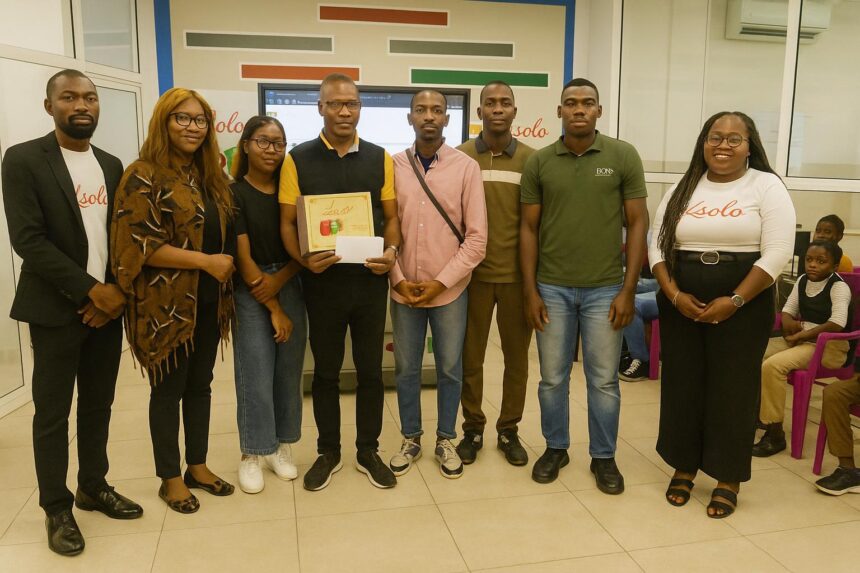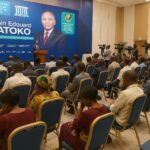Brazzaville buzzes as board game finals unfold
Saturday evening, curious onlookers crowded a brightly-lit hall in downtown Brazzaville, phones aloft, as the very first “Lissolo Challenge” reached its final turn. The atmosphere echoed a football derby: cheers, suspenseful silences, and finally a victorious shout that confirmed a new cultural craze sweeping the capital.
- Brazzaville buzzes as board game finals unfold
- Meet the victorious “Winner Premier” team
- Why Lissolo 2.0 is more than a game
- Learning Congo’s story one card at a time
- A creator’s vision of family fun
- Building bridges across generations
- 50,000 CFA francs and bigger ambitions
- What’s next for the Lissolo community
Minutes later, event host Nathalie Logonou lifted a wooden trophy shaped like the country’s outline, signaling that a locally designed board-game, not an imported bestseller, had just written itself into Congo’s pop-culture diary. Cameras flashed, TikTok live feeds spiked, and parents exchanged proud glances at their children.
Meet the victorious “Winner Premier” team
The loudest celebrations came from five teammates playing under the banner “Winner Premier”. Roger Mankindou, Miveck Rhignanga, Lutther Mabiala, Davy Madassou and Amadou Samanke each pocketed 50,000 CFA francs—roughly the monthly minimum wage—after edging rivals in a nerve-racking tie-break round that tested memory and strategy.
Still catching his breath, team captain Mankindou framed the win as a beginning rather than an end. “If you truly want to understand where we come from, start with this board,” he said, lifting the colourful deck. His teammates nodded, already plotting community workshops in Brazzaville’s outskirts.
Why Lissolo 2.0 is more than a game
Lissolo 2.0 looks at first glance like other trivia-style boxes: dice, tokens, question cards. Yet each square on the board mirrors one of Congo’s regions, inviting players to travel Metou, Kouilou or Likouala without a bus ticket. The mix of history, language and economics keeps rounds dynamic.
Project manager Hugues Wilson, who spent two years compiling data, believes the format resonates because it transforms textbooks into stories. “Statistics on agriculture feel abstract, but answer a question under pressure and you suddenly remember your grandmother’s cassava field,” he laughed, crediting volunteer teachers who validated the content.
Learning Congo’s story one card at a time
Each deck contains 300 cards layered by difficulty. A green card might ask the official language of the Sangha; a red one could require naming two female ministers since 1979. Players not only gain points but build a mental map of governance, geography and culture formal curricula sometimes rush through.
Teachers from Lycée de la Révolution who attended the finals said they plan to integrate short Lissolo rounds into civic-education periods. According to instructor Marie-Claire Ndzana, the playful format “unlocks shy voices in class and makes local examples more concrete than dating the French Revolution,” an observation greeted with laughter.
A creator’s vision of family fun
Behind the colourful board stands entrepreneur Kris Brochec, a communication graduate who returned from Paris in 2018 determined to spotlight Congolese narratives. “I grew up around evenings of Monopoly and Scrabble that never mentioned Kintélé or the Mayombe forest. Lissolo corrects that absence while keeping the same excitement,” she explained.
The name itself means “roots” in Lari, reminding players that identity starts from home. Brochec financed prototypes through small crowdfunding rounds and a micro-loan from a local cooperative. She now employs seven artisans in Makélékélé who cut, print and package the sets with recycled cardboard sourced from Brazzaville markets.
Building bridges across generations
Throughout the finals, children knee-high to the board hovered beside grandmothers who commented on regional proverbs. That simple image, says sociologist Alain Diaw, illustrates the game’s social glue. “Inter-generational knowledge transfer often relies on folklore evenings; Lissolo offers a structured but equally intimate alternative,” he noted on site.
Organisers added a small twist: whenever a senior corrected an answer, the table earned bonus tokens, ensuring elders played referees, not spectators. The rule quickly became a fan favourite, turning potential gaps in schooling into lively anecdotes about village life, traditional dishes or forgotten musicians from Radio Congo archives.
50,000 CFA francs and bigger ambitions
The cash prize, provided via a partnership with a Brazzaville fintech start-up, may seem modest compared with international e-sport jackpots. Yet for the five winners it covers a semester of university fees or seed capital for micro-projects. They have already earmarked part of the envelope for buying extra Lissolo sets.
Mabiala says his neighborhood library in Mfilou will receive one of those sets. “Kids come after school but get bored once the Wi-Fi hiccups. This board will keep them busy and learning,” he explained. Local councillor Carine Ibata promised to sponsor weekly mini-leagues if the demand stays consistent.
What’s next for the Lissolo community
Kris Brochec announced that “Lissolo Days” will soon tour Pointe-Noire, Dolisie and Oyo, with pop-up arenas in shopping malls and school courtyards. A digital companion app, still in beta, will let diaspora players duel in real time while ordering physical decks for relatives back home.
Before the crowd dispersed, organisers posed for a group selfie under a banner reading “Our History, Our Game, Our Future”. On social media, the hashtag #LissoloChallenge reached trending status across Congolese timelines, proving that in 2023 a cardboard board can compete with consoles—and bring people around one table.
Authorities from the Ministry of Culture, observing the final, hinted at potential curriculum collaborations. An official communique later praised the initiative for “supporting national cohesion and creative industries in alignment with the Horizon 2025 cultural policy,” a recognition that could unlock grants and wider distribution in public schools.





















